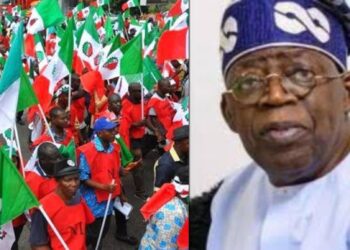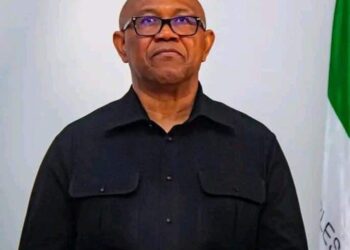Deputy president of NLC, comrade Joe Ajearo spoke with MOSES JOHN on the preparations to the 2015 National Delegates Conference (NDC) of Nigeria Labour Congress (NLC) amongst other national issues. Excerpt.
The NLC delegate conference is fast approaching, what are your expectations?
We are expecting that with proper preparation without intrigues, this convention will be rancour free and that is the prayer and dream of every worker. At least we should be seen to be doing things differently from the politicians. Because it is all about service to the workers. And we don’t behave as if there is something to earn there. It is not like where you get constituency allowance. If it must be clearly service to workers, we shouldn’t be seen fighting over it.
From the last delegate conference to date, what achievement has the present administration made?
We have achieved a lot, given the time and circumstances around us. Basically, the issue of minimum wage which was moved to 18 thousand naira was achieved during this present leadership. Don’t forget that the NLC is just like a club where members can join. The basic achievements are by the individual unions. NLC is just an umbrella union if in my union I am looking for something and I can’t get it, the tendency if for me to go to NLC as a father to now assist. During this period, most unions have had landmark achievements. So, if you collate the more that 40 affiliates unions of the NLC, you will see that it is the labour movement. In most instance, it is only when they couldn’t conclude an issue that they need the father figure of the NLC, it is on such rare cases and on national issues like minimum wages that they run to NLC.
People believe that labour is not as vibrant as it used to be during the days of Adams Oshiomole. What is you take on this?
Adams was a general secretary, he was a factor worker and later became a paid staff. So by the time he was coming up, he was already thorough bred. And he also served as deputy president to Pascal Bafyau. That is one. I am equally lucky to have worked with people we call first generation general secretaries like Adams. Those first people that after the creation of industrial union became general secretary, if you work under their tutelage, you will learn a lot. It won’t be like somebody that just became GS yesterday. The issue of mentoring is very important. If you bring the Ejiofors of this world, if they talk, you know that they are vomiting unionism. So if you are lucky to have work with such people
Another point is that there is problem which societal. Before now, you can’t serve as a unionist without being ideological. Those ideologies guide you as principle. You can’t go there to look for money or to cheapen yourself. It is just the defence of workers. I am also amongst the cadre that moved in from student unionism and recruited into union politics. That was the process of recruitment then. Today, you still wonder the recruitment process. But even if you are to replicate it, is this the NANS we are seeing, is this the kind of NANS that will engage IBB or the military? Even the place you are going to recruit from, what is left of it? So that is a societal problem. And everything that is happening in the society, has the tendency to reflect in other sector, whether it is in labour or academic. I think the society has a lot of influence on that
The former NLC president Adams Oshiomole canvassed for labour activists to also partake in politics. What do you think is the major factor hindering workers from partaking in active politics or standing for elective position?
First and foremost, the problem is the monetisation of politics in Nigeria. If you work for 35 years, and you have four kids, dependent relatives no matter your salary, it will be difficult for you to save enough to buy ticket or nomination form of any party. You may have the best idea, but when it comes that, you discover that you can’t make it. Unless probably during that period, while working, you are fortunate to have made money either by combining you work with other things, but the end product is that you need to still go to god fathers. And if you are somebody that runs a policy that is based on principle and you don’t want to be control by god fathers, it will equally be difficult for you to go and succumb to god fathers. In some instances in this country we are told how and if you have agreement with your god father that ‘I am going to be giving you N100 million every month, when you enter, office there will be another level of looting for you to meet up. There are a lot of factors hindering the workers to participate in politics. But if it is just belonging to political a party, that is different, but seeking for elective offices, you can’t fund it. Elections have been commercialised in the country that it is almost beginning to go become a no go area.
What solution do you suggest to the monetisation of politics in Nigeria?
Solution might not be short in sight because there is so much poverty and there is nothing anybody can do about it. Most people feel that even if it is N1000, it is that share without knowing that they are mortgaging their future. The value system in Nigeria has been bastardised. If you are a graduate in Nigeria for four, five years and you don’t have a job, people talk look down on you. That is why the crave for money is becoming the in thing. In those days, people were afraid to steal so as not to dent their family reputation, but these days, people steal so much and they give you chieftaincy title. So until we remove this attachment on money, we are going to find it difficult. It is a societal problem. Our educational system today, the emphasis on civil education is no longer there. On who is a good citizen? A good citizen appears to be that one that has a lot of money not that one that will see 20 million and return it. To correct this, we have to go back to our schools, from when children are getting into primary school, it has to be a gradual process.
Are you contesting for president of NLC in the next delegate conference?
There is only one position I have not occupy as a unionist and that position is the position of president of NLC. At the union level, I have reached the point of no promotion as general secretary. And at the NLC I am a deputy national president. Unless maybe am lame, deaf and dump, that I will say I am not interested. Naturally, I should be interested.
If elected president, what difference would like to make?
We are going to work. We are going to reintegrate with our allies. We are not going to depend on the trade union alone. We are going to move with the labour movement. And labour movement encompasses the civil societies, lecturers, market women, students and so on. If we capture that group, then we can say we are the people. And we will move based on what our people say we should do. We are going to dine and weep with our people, especially the workers. The issue of multinationals just waking up and sacking indiscriminately will not be tolerated. We are going to bring back the dignity of the worker. I cannot betray the Nigerian workers. That is one thing even my critics will tell you, that my commitment to the Nigerian worker is not in doubt and it will not change.
The labour movement fought for fuel subsidy, yet the movement has not been on the forefront for fighting corruption. What is your take on this?
We have not really institutionalise a mechanism to insists on probing a person found to have corruptly enriched himself. Labour can think in that line. And for us to do that, we don’t have the police or the EFCC. It may end at the level of agitation. You know also that this has legal limitation because the law says nobody is guilty until proven innocent. That is a limitation. We can quantify morally that this person is guilty, but if there is no clear case of corruption, we are limited. But one of the basic things I will come up with is for us to be proactive and not reactive. Which means that, I will ensure that we give a charter of demand to those in authority. We will sit down have a think tank on the power sector and say if you do this, we can achieve this, if we look at policy on unemployment, how many jobs do we create annually, and so on. So by the time we present this policy to them, we may sit back and watch how they are implemented and not to react each time there is problem. We should have a programme on ground that at the first May Day, we hand it over to whoever it the president that this is our charter of demand.
What would you say about the recently concluded national conference?
The outcome of the conference was a good one. We don’t know if the implementation will be a good one. I never believed that anybody would subject the outcome of the confab to the national assembly. If you do it, you water it down and destroy it. The debates there were robust. Majority of the people that went there were not o yes men. Now that they have reached some agreements, if those agreements are not implemented then the whole money spent there would have been in vain.



